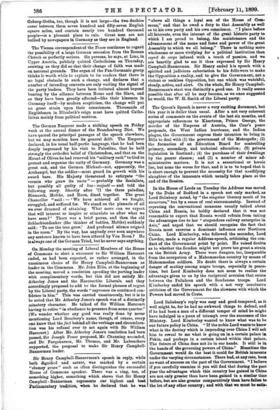Sir Henry Campbell-Bannerman's speech in reply, while both dignified and
astute, was marked by a certain "clumsy grace" such as often distinguishes the successful House of Commons speaker. There was a ring, too, of something higher, something which shows that Sir Henry Campbell - Bannerman represents our highest and best Parliamentary tradition, when he declared that he was "above all things a loyal son of the House of Com• mons," and that he owed a duty to that Assembly as well as to his own party and his own conscience. "I place before all interests, even the interest of the great historic party to which I am proud to belong, the maintenance and the advancement of the name and fame and power of the great Assembly to which we all belong." There is nothing more wholesome or more vivifying for a political institution than esprit de corps infused with a touch of passion, and we are heartily glad to see it thus expressed by Sir Henry Campbell-Bannerman. Sir Henry ended h is speech with a spirited and judicious exhortation to his followers to make the Opposition a reality, and to give the Government, not a violent or reckless Opposition, but one which was watchful, steady, active, and alert. On the whole, Sir Henry Campbell- Bannerman's start was distinctly a good one. It really seems possible that after all he may become, as we once suggested he would, the W. H. Smith of the Liberal party.






































 Previous page
Previous page